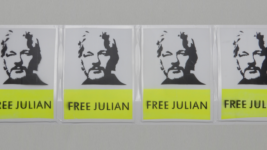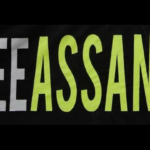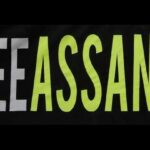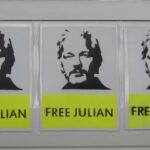UK Rejects Assange’s Appeal Against Extradition, Despite Global Campaign for Freedom

UK High Court Justice Jonathan Swift last Thursday denied Julian Assange’s July 2022-lodged final appeal against US extradition, which then UK home secretary Priti Patel had greenlighted the month prior. This has meant the WikiLeaks founder has spent another year in prolonged isolation waiting.
The health of the Australian journalist and publisher of the indisputable truth has deteriorated drastically over his four years on remand in London’s Belmarsh Prison, and fears for his life have long been raised by doctors, while prominent voices have asserted US extradition would mark his end.
Ever-resilient Stella Assange has explained that next Tuesday, her husband’s lawyers will lodge a renewed appeal application, which will “proceed to a public hearing before two new judges”, and she remains optimistic Julian won’t be imprisoned in the US for revealing Washington’s war crimes.
The appeal rejection has come as a kick in the guts to the rising local movement to see the Townsville-born son’s case dropped and for him to return home, and not only are larger numbers of the community now rallying, but there’s also bipartisan federal leadership support for his release.
But that united front to see the Australian citizen set free from the torture of our closest allies, was already flattened, when it was revealed that the Biden administration is still sharpening its knives in preparation, as it’s come to light that the FBI has reopened its investigations into Assange.
The extralegal rule of law
As foreign minister Penny Wong notoriously explained in February, her government has and will continue to express to the US and UK that the case has “dragged on too long”, but, as for intervening further, she said, it’s not possible as in “both countries… we’re discussing, the rule of law prevails”.
Yet, whilst this assertion by the minister for foreign affairs might be uncontroversial in general, this case is a glaring anomaly to the rule of law, with the Assange Campaign having pointed this out clearly, on Thursday, as it listed the grounds of appeal that the UK justice system just knocked back.
Assange’s lawyers put to the High Court that Patel’s extradition approval is problematic as it violates article 4 of the UK-US Extradition Treaty of 2003, which specifically denies extradition for a political offence or if the extradition is politically motivated, with both these points applying to this case.
While section 81(a) of the Extradition Act 2003 (UK), specifically prohibits an extradition, which purports to be in regard to an extradition-permitted offence, when in fact the request has been “made for the purpose of prosecuting or punishing him on account of his… political opinions”.
Further grounds of the appeal were that Assange is “being prosecuted for protected speech”, “the US has misrepresented the core facts” in the British courts, the case further violates international law, and the “request and its surrounding circumstances constitute an abuse of process”.
Laws don’t apply to Empire
A key breach of the rule of law Assange legal advisor Greg Barns SC has often pointed to is the US claim to extraterritoriality, as Washington has reached across borders to arrest a foreign national under its domestic espionage laws, due to journalistic acts carried out on the soil of another country.
“The extraterritorial reach of the proposed prosecution is so dangerous because, one day, it could be another Australian journalist or publisher who finds themselves on an extradition request,” Barns said in February.
The US arrested Assange by proxy in the UK on 11 April 2019, on a trumped up computer hacking charge, and by May, a superseding indictment added an additional 17 charges under the US Espionage Act of 1917, while a further second superseding indictment was released in June 2020.
Assange is being pursued as, much to the chagrin of the White House, he published thousands of classified US files, leaked by then US army officer Chelsea Manning over 2010-11, which exposed extensive war crimes. And despite claims to the contrary, he did redact names to protect lives.
Dozens of major mastheads globally joined publishing site WikiLeaks in printing the same details as it did. But the US has only charged Assange in relation to this, via offences relating to obtaining and publishing unredacted materials, with all the charges combined carrying a maximum of 175 years in prison.
But Sydney lawyer Mark Davis, then an SBS journalist, spent a month with Assange in 2010 prior to the Iraqi war logs being released, and he’s repeatedly confirmed that he saw the WikiLeaks founder personally redacting 10,000 names from the files to save risking lives over a three day period.
Domestic support escalates
Greater numbers of the Australian public have woken up to the lies about Assange, as the massive 24 May Free Assange rally through Sydney was testament to the fact that the people don’t want to watch as a fellow citizen is crucified for one of the bravest and greatest journalistic acts of all time.
“What is very telling is the consistently high percentage of the Australian population wanting Assange free,” said Support Assange and Wikileaks Coalition spokesperson Ian Rose. And he pointed out that of around 2,200 locals recently polled, 88.7 percent want to see Julian brought home.
“As is the ever-increasing number of parliamentarians joining the parliamentary friends of Assange,” the long-term outspoken Assange supporter told Sydney Criminal Lawyers. “One of the speakers at the rally said there are now 55 members.”
Officially known as the Bring Julian Assange Home Parliamentary Group, it was established by Independent MP Andrew Wilkie in 2019, and it’s a cross-party coalition of federal MPs and senators that are actively pushing for the release of the WikiLeaks founder.
Another event that’s bolstered the hope that the Assange saga could soon be brought to an end, was that the co-chairs of the group, which include Greens Senator David Shoebridge, met with US ambassador Caroline Kennedy on 8 May, to express the broad concerns within parliament for Julian.
And whilst attending the recent Sydney CBD rally, Stella Assange, remarked, “Now, we have real hope that Julian will be able to step out into the sun once more”.
Can’t get a real argument up
Anthony Albanese becoming PM also heightened locals hopes that Julian’s case may be dropped, as whilst he was Labor leader in opposition in February 2021, he said, in response to a question about the pursuit and imprisonment of Assange, “Enough is enough”.
When asked during a May 2022 presser if he was taking action on Assange, the then PM said he was but via secret diplomacy, as “not all foreign affairs is best done with the loud hailer”, while in November, he told parliament that he’d made his point clear to the US in enough being enough.
In addressing the Assange matter last February, Wong didn’t use the same term, but she basically expressed the same sentiment in saying, “We have raised it at appropriate levels, and we’ll continue to do so, and the government’s position is that this matter has dragged on too long.”
However, an official government position being “enough is enough” when two of its closest allies are committing what amounts to ongoing torture and are close to killing an Australian citizen, who hasn’t broken the law, is no policy position at all, but rather flaccid diplomacy.
Sure, the Morrison government did nothing, but the last PM smugly cheered on the pursuit of Assange. The new Labor leader of the nation, however, can’t even get up the courage to say to our two closest allies, “Stop killing our citizen via an illegal process and return him.”
Rather all Albanese has said is that his government thinks the UK and the US are taking a tad too long with its drawn-out torture of an Australian citizen, without specifically demanding that the US prosecution of Assange doesn’t take place.
So, it’s no wonder Liberal leader in opposition Peter Dutton joined the chorus last month, stating “this has gone on too long”, as the former home affairs minister is aware that what Albanese has been saying is ineffective, but could pick up a few local votes, so why not get in on the action.
US intelligence continue pursuit
But while PM Albanese repeated his now embarrassing mantra, “enough is enough”, during an ABC interview on 5 May, and went on to say the matter “needs to be worked through” and he’s “working through different diplomatic channels”, the US, it seems, doesn’t agree that enough has been done.
The Sydney Morning Herald revealed on 1 June that the FBI had attempted to contact British novelist Andrew O’Hagan to speak with him about what he knows of the WikiLeaks founder, during the same week that Stella Assange had addressed the National Press Club in Canberra.
O’Hagan turned down the offer, as he made certain that he opposes the US attempt to punish Assange for the mere act of publishing documents provided to him, in a manner that journalists are expected to do.
The author further believes that as he’s publicly criticised Julian in the past, after their relationship soured, it’s likely that the Federal Bureau of Investigation was sniffing around for new evidence about Assange, which means that US authorities have recommenced investigating the Australian.
“The FBI suddenly having a new need to investigate Assange reveals the USA is grasping at straws,” Rose said, underscoring a widespread opinion that the case Washington has brought against him is so full of holes it would fall over if it ever went to court. Of course, that’s if the rule of law applies.
But what this also indicates is that despite the public, a cross-section of federal parliamentarians, and now bipartisan leadership all calling for his release, US intelligence agents are still fishing around for evidence, which means the White House isn’t even considering an end to the matter.
Drawing out the torture
The UK originally blocked Assange’s extradition in January 2021, as UK District Court Judge Vanessa Baraitser found, based on a psychiatric assessment, that Assange poses a serious suicide risk if he is ever sent to the US to face prosecution.
This decision was based on the likelihood that the WikiLeaks founder would be subject to special administrative measures in US detention pretrial and post-conviction. The SAMs regime involves enhanced isolation and other extreme measures, usually reserved for terror suspects and offenders.
However, the UK High Court went on to overturn the decision to refuse extradition in December 2021, primarily based on four assurances the White House provided on appeal, in relation to the treatment Assange would receive in its prison system.
Washington pledged to permit Assange to serve any resulting prison time in Australia, along with providing “appropriate clinical and psychological treatment” whilst detaining him, and it further assured that he wouldn’t be placed in SAMS or in Colorado’s harsh ADX Florence prison facility.
But the US document making these pledges carried one proviso, which was it won’t detain him in SAMS “unless, after entry of the assurances, he commits any future act which renders him liable to such conditions of detention”.
So, whilst the UK justice system accepted these pledges, most Assange supporters don’t think they’re worth the paper they’re printed on.
As for the supreme leader of the AUKUS powers Joe Biden, his position on Albanese’s diplomacy seems to be, “Shut up and just buy the damned nuclear-powered subs.” And one can only assume that he’s making sure that a SAMS regime cell is being kept extra cold in readiness for Assange.
Indeed, Biden, as vice president of the Obama administration, called Assange a “hi-tech terrorist” during a 2010 NBC interview, and he basically laid out the premise for the case Washington was to bring against the WikiLeaks founder over a decade prior to any assertion he would be prosecuted.







